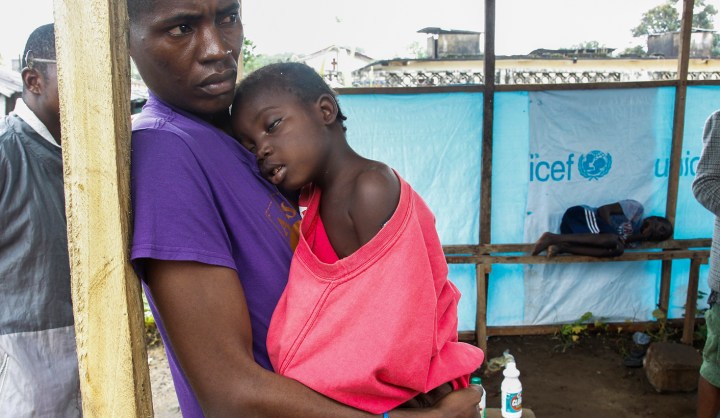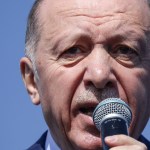World
Op-Ed: Ebola is everybody’s business

The 2014 Ebola outbreak needs to become a moment where those who follow will mark it as a turning point where the world rallied; where donors, rich countries and health agencies acted decisively to invest in health systems on which billions of vulnerable people rely. By ANSO THOM.
Ill fares the land, to hastening ills a prey,
Where wealth accumulates, and men decay.
–Oliver Goldsmith, Anglo-Irish writer (1730-1774)
The images are beamed around the world. Emaciated bodies, lying solo at hospital gates, in one-bedroom corrugated iron shantytown shacks, in bare makeshift hospital rooms or on potholed, muddy streets. Poor people are dying in mostly undignified settings, often alone, often shunned by fearful family and friends or an absent health system. The lucky few who reach humanitarian centres have a chance to survive, but it is mostly against great and often insurmountable odds. And sadly, even if many people do make it to some form of help, they are failed because there simply is no health system able to offer the basic level of healthcare, to which every single human being in the world should be entitled to access as a human right.
As was the case for many years with HIV, those who have the means and money to buy a hospital bed where they can access clean water, some medication, caring and trained healthcare workers or a basic intravenous drip, have a chance of survival or at the very least a dignified and pain-free end. However for thousands of west Africans contracting Ebola has been a painful, debilitating and undignified death sentence.
In many ways the ever-growing Ebola epidemic is showing up the fault lines, not only in buckling or collapsed health systems, but in society’s failure to show solidarity with the “them”, with the poor and voiceless.
The 2014 Ebola outbreak needs to become a moment where those who follow will mark it as a turning point where the world rallied; where donors, rich countries and health agencies acted decisively to invest in health systems on which billions of vulnerable people rely, but are failed daily.
And as was the case in our own backyard when we finally responded to HIV and dismantled Apartheid, South Africa can once again take the lead.
However, for many years the battle against HIV and Apartheid was a lonely one fought by small groups of people.
For the people of Liberia, Sierra Leone and Guinea the question must again arise: “Where is everybody?”
Yes, the United States is now sending troops. Yes, Doctors without Borders (MSF) and the International Red Cross has sent help. Yes, the World Health Organisation (WHO) is creaking into action. Yes, the Bill & Melinda Gates Foundation has made a massive donation. However, where has the solidarity been?
Ebola is showing in Technicolor that the life of a person in the United States, United Kingdom, Europe, South Africa and many other better-off countries, is worth so much more than that of a person who has had the misfortune of contracting Ebola in the slums of Monrovia.
It is an indictment that in a world where football clubs pay breathtaking amounts of money to “buy” the latest star or business moguls collect sports cars at a whim, people are dying because there is no nurse to rehydrate an Ebola patient or even a simple bed for someone to rest their diseased bodies.
How much longer are we as a world going to divert our eyes from this unpleasant reality, these painful images? How much longer before we make a meaningful effort to level the playing fields? It will be a travesty if, as projected, this Ebola epidemic continues to spiral out of all control in a world where we have all the means, skills and know-how to repair and fix health systems, get drugs to the most far-flung corners of the world and stem a disease that mostly responds to good, old-fashioned health CARE.
Could the world’s foot dragging be ascribed to the nature of the threat?
This threat does not come neatly packaged with a military solution. This so-called threat comes in the form of an invisible, transmissible virus that mostly affects the poor far, far away on a continent where the dominant media images have for years been that of emaciated stick figures with pain and desperation in their fly-covered eyes. It challenges the long-held pessimism and slow, inadequate or non-responses to addressing the issues of the poor.
So, what needs to happen?
As a start the world needs to stop putting monetary value on what it would take to tackle what is now being called a “public health crisis” – this is the first time since HIV that the United Nations has been prepared to revisit this definition for a health-related issue. This is not about money, or security. It is about rights to health and health care. It is about doing the right thing to tackle a disease that is fast and effortlessly outpacing the paltry international efforts to respond.
WHO Director General Dr Margaret Chan has admitted that the current reports that show that more than 5,500 people have been infected by Ebola and more than 2,500 killed by it in west Africa are “vast underestimates”.
In The Lancet journal, Prof Lawrence Gostin of the O’Neill Institute for National and Global Health Law, at Georgetown University Law Centre in Washington DC, has penned a clear commentary, offering some hints on the way forward:
Gostin points out that this is the first Ebola outbreak to engulf major urban areas, with intense patterns of transmission.
“If the affected countries had adequate public health systems that were able to rapidly identify cases, trace contacts, and isolate infected and exposed patients, they probably would have contained Ebola within rural settings. The countries most affected by Ebola, however, rank lowest in global development, lacking essential public health infrastructure, the most basic of which is an adequate health workforce. The WHO estimates a shortage of 7,2-million doctors, nurses, and midwives globally, with the countries most affected by Ebola among the worst off.”
Even before the loss of lives, Liberia and Sierra Leone had only about 90 and 136 doctors, respectively.
Gostin goes on to point out that Guinea is only marginally better off, with fewer than 1,000 doctors for a population of more than 11-million people. The loss of nurses, too, will have long-term repercussions. At one Sierra Leone hospital, for example, 15 nurses have died among 22 total health workers, with only three nurses avoiding infection; the country barely had 1,000 nurses before the outbreak.
Gostin goes on to pose the burning question on how this Ebola outbreak could have been averted, and what states and the international community could do to prevent the next epidemic.
He responds that the answer is not untested drugs, mass quarantines, or even humanitarian relief. “If the real reasons the outbreak turned into a tragedy of these proportions are human resource shortages and fragile health systems, the solution is to fix these inherent structural deficiencies,” writes Gostin.
He goes on to make a number of important recommendations, one being the establishment of a dedicated International Health Systems Fund that would build national capacities not only to respond rapidly to public health emergencies, but also to enable low-income and some middle-income countries to deliver comprehensive health services.
Although perhaps five months too late for those who have died and continue to perish, on 18 September the United Nations in the form of the Security Council held its first emergency meeting on a public health crisis and declared the Ebola outbreak in west Africa a threat to peace and security.
This move is supposed to translate into, in the words of the UN General Secretary General Ban Ki-moon, “a new emergency health mission to combat one of most horrific diseases on the planet that has shattered the lives of millions”.
The United Nations Mission for Ebola Emergency Response, or UNMEER, will have five priorities according to Ban: stopping the outbreak, treating the infected, ensuring essential services, preserving stability and preventing further outbreaks.
Briefing the UN, Dr Chan said: “None of us experienced in containing outbreaks has ever seen, in our lifetimes, an emergency on this scale, with this degree of suffering and with this magnitude of cascading consequences.”
However, the UN has made such noises before on HIV/AIDS and although there has been progress we know that is many poor communities HIV remains a death sentence because of poor access to quality health services.
This time around the UN has to walk the talk.
The sense of abandonment experienced by those affected is heartbreaking and an indictment on the entire world.
Once we have managed to bring this epidemic under control tough questions need to be posed on why there has been a delay, how it happened in the first place and many other pertinent questions.
It will also be important that South Africa, viewed as a superpower on the continent, will be able to show that it not only did what was required inside its borders, but also outside.
One has to hope that when all is said and done South Africa would have stood the test of time and show true solidarity with the people of west Africa, not only in word and beautifully crafted media statements, but in our actions. We will also need to judge if African leaders, often sensitive to so-called interference from the West, has shown leadership, political will and wisdom in their responses.
Gostin expresses the hope that the west African Ebola epidemic could spark a badly needed global course correction that would favour strong health infrastructure. “Sustainable funding scalable to needs for enduring health systems is a wise and affordable investment. It is in all states’ interests to contain health hazards that may eventually travel to their shores. But beyond self-interest are the imperatives of health and social justice—a humanitarian response that would work, now and for the future.”
The world and SA have to understand that not having proper healthcare or a system able to respond to an outbreak such as Ebola is everybody’s business. DM
Anso Thom is writing on behalf of SECTION27 and the TAC.
Photo: A picture made available 19 September 2014 shows a Liberian man holding his daughter exhibiting symptoms of the Ebola virus in a waiting room outside the John F. Kennedy (JFK) Ebola treatment center in Monrovia, Liberia, 18 September 2014. In Geneva, the World Health Organization (WHO) said the toll had crossed 2,600, and that the suspected and confirmed cases stood at 5,335 in Guinea, Liberia and Sierra Leone with half that number coming from Liberia, the hardest hit country in the region. EPA/AHMED JALLANZO















